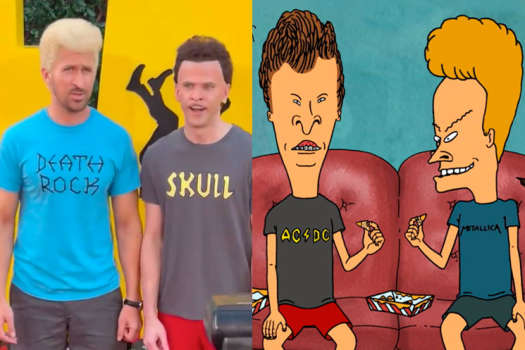The story of one of the world's most enduring video games is intriguing — but maybe not as intriguing as director Jon S. Baird had hoped. As Tetris pads out its 118-minute runtime with Hollywood car chases and thick Russian espionage plots, it finds itself in a wayward space: too serious to be campy, too campy to be serious. For all its shortcomings, though, it's still an interesting story (especially for us intellectual property nerds out there) with enough entertainment to go around.
Tetris begins in the mid-1980s, when video game technology is experiencing a boom. Big players like Nintendo, Atari and Sega are already in the mix, and people like Dutch-born/American-raised/Japanese-resident game designer Henk Rogers (Taron Egerton) are on the look out for the next big thing. While at the Consumer Electronics Show pushing his own failing game, Henk comes across a simple puzzle game with falling blocks. Captivated by Tetris and sensing its potential, Henk hurries to gather the financing to secure licensing rights.
These opening moments are painted with an 8-bit aesthetic, with Egerton's narration guiding us through the early days of Henk's journey. While the film starts off as a fun and thrilling ride, Noah Pink's script eventually takes a Hollywood dive.
Henk's quest in obtaining the handheld, computer and console rights to the game lands him in the Soviet Union, where Tetris was created by Alexey Pajitnov (Nikita Efremov). Once behind the iron curtain, Tetris continues its contract law story with bad deals and dodgy contract terms discovered, but all under the guise of a Soviet espionage thriller.
Comically evil KGB henchmen and douchebag British nepo babies are brought into the mix, as Henk and Alexey's comparatively simple story about video game licensing balloons into a Cold War caper. However, amidst some broad performances and the stereotypical Soviet set design are some fun chase scenes that employ the 8-bit schtick in a fun way.
Egerton's performance, in particular, stands out as being the grounding point for the film. When everything around the film feels too broad, he brings the personal touch and draws out the intimacy; and when the movie becomes too bogged down in legalities, he lends a comedic tilt. He continues to impress as an actor and is surprisingly underrated among those of his generation, even though he has consistently delivered engaging turns.
Perhaps the actual story of Tetris is too simple and/or niche for a movie — although the threats to both Henk and Alexey's lives was very real, and Alexey's individual story is very compelling. But the red flourishes used brings Tetris too far away from the terms and conditions we expected from the opening scenes.
(Apple)Tetris begins in the mid-1980s, when video game technology is experiencing a boom. Big players like Nintendo, Atari and Sega are already in the mix, and people like Dutch-born/American-raised/Japanese-resident game designer Henk Rogers (Taron Egerton) are on the look out for the next big thing. While at the Consumer Electronics Show pushing his own failing game, Henk comes across a simple puzzle game with falling blocks. Captivated by Tetris and sensing its potential, Henk hurries to gather the financing to secure licensing rights.
These opening moments are painted with an 8-bit aesthetic, with Egerton's narration guiding us through the early days of Henk's journey. While the film starts off as a fun and thrilling ride, Noah Pink's script eventually takes a Hollywood dive.
Henk's quest in obtaining the handheld, computer and console rights to the game lands him in the Soviet Union, where Tetris was created by Alexey Pajitnov (Nikita Efremov). Once behind the iron curtain, Tetris continues its contract law story with bad deals and dodgy contract terms discovered, but all under the guise of a Soviet espionage thriller.
Comically evil KGB henchmen and douchebag British nepo babies are brought into the mix, as Henk and Alexey's comparatively simple story about video game licensing balloons into a Cold War caper. However, amidst some broad performances and the stereotypical Soviet set design are some fun chase scenes that employ the 8-bit schtick in a fun way.
Egerton's performance, in particular, stands out as being the grounding point for the film. When everything around the film feels too broad, he brings the personal touch and draws out the intimacy; and when the movie becomes too bogged down in legalities, he lends a comedic tilt. He continues to impress as an actor and is surprisingly underrated among those of his generation, even though he has consistently delivered engaging turns.
Perhaps the actual story of Tetris is too simple and/or niche for a movie — although the threats to both Henk and Alexey's lives was very real, and Alexey's individual story is very compelling. But the red flourishes used brings Tetris too far away from the terms and conditions we expected from the opening scenes.




